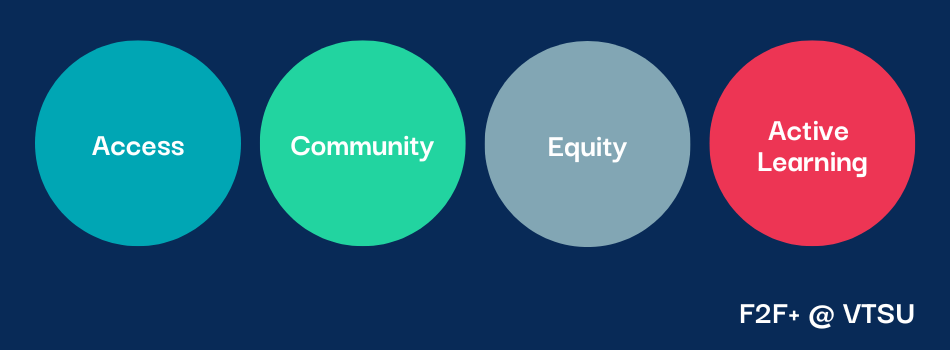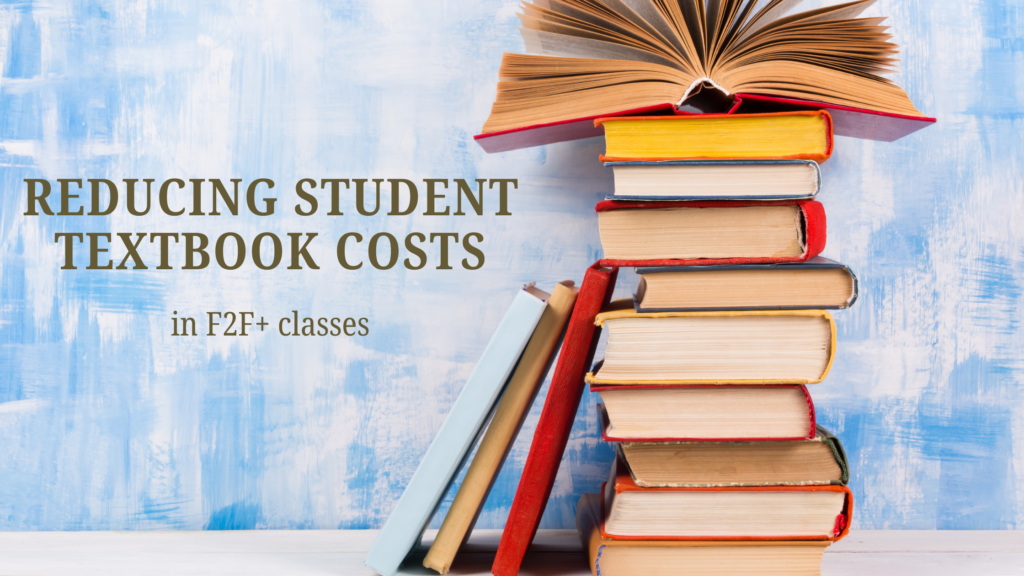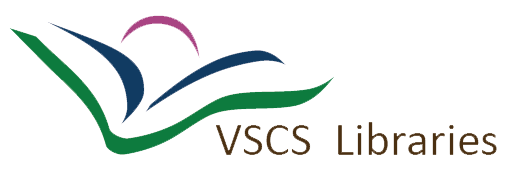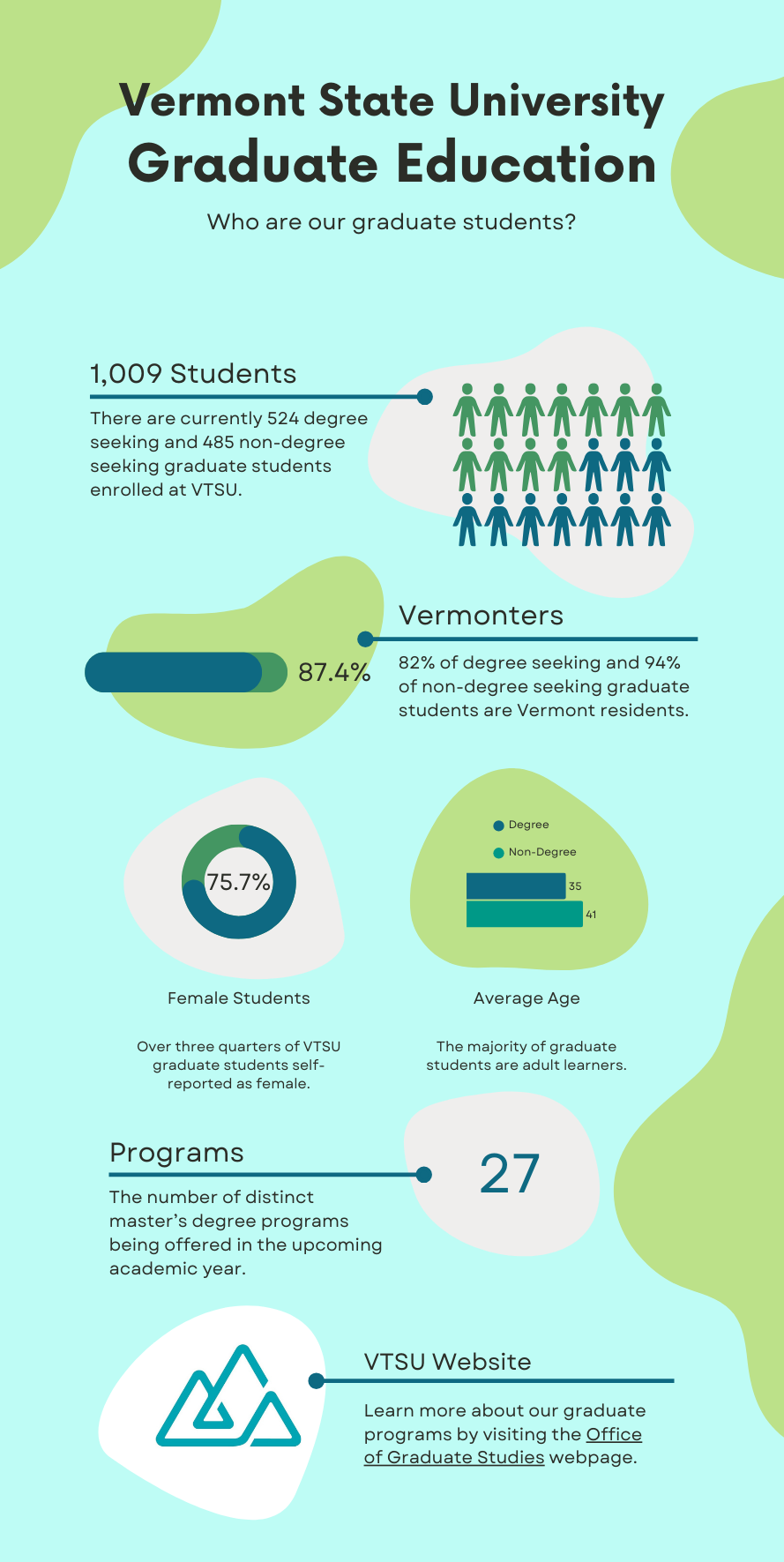April 2025 | Issue 9 | Volume 2 | Previous Issues
Introduction
In this month’s issue, our primary topic is graduate education at Vermont State University. In addition to the embedded infographic in this section, we’ve also included a narrative written by the Dean of Graduate Programs, David McGough, which describes the history, vision, and current landscape of graduate education at the institution. There is also a faculty spotlight in which Professor Gina Mireault shares some of her experiences teaching graduate level students as well as recommendations for instructors who may be working with them for the first time.
This issue of the Vermont State Educator also includes several campus partner updates, information about the availability of the summer and fall syllabus templates, paid professional development opportunities, and upcoming workshops that were recently posted on the CTLI events calendar.
We have also begun organizing a book group for the Fall 2025 semester. If interested, please submit the sign-up form and we’ll look forward to meeting with you later in the year!
Best regards,
Jen Garrett-Ostermiller, Director
Jeff Tunney, Associate Director
Center for Teaching & Learning Innovation @ VTSU
Get to know us!
Graduate Education at Vermont State University

David J. McGough, Ph.D.
Dean of Graduate Programs
Graduate education at VTSU is deep, diverse, and distinct. However, the complexity of our offerings and operations can be overwhelming. This essay provides an overview of the graduate landscape to help demystify this realm of the university.
History & Vision
Beginning over 50 years ago, soon after the state’s two-year teacher’s colleges transitioned into four-year comprehensive colleges, Johnson State College—one of VTSU’s heritage institutions—began offering master’s degree programs in education and counseling. Later, master’s degree programs were developed at Lyndon State College, Castleton University, and VT Technical College. This long-standing experience with graduate education provides deep roots for VTSU’s current vision to expand graduate offerings for Vermonters and our neighbors throughout the world.
Our core mission for graduate education is to offer opportunities for career establishment, advancement, leadership, and renewal through degree programs, certificates, courses, events, research projects, and public service.
Graduate Array
The mission and vision for graduate education supports a diverse array of offerings.
Degrees: VTSU offers 27 distinct master’s degrees clustered under 18 titles. Seventeen are outlined in the current Graduate Catalog, with one set to launch for AY25-26. The degree programs serve two broad aims and audiences.
- Career establishment programs, such as accelerated and career-change master’s degrees, provide comprehensive preparation for entering a profession while introducing students to scholarship in the field.
- Career advancement programs, such as professional learning and interdisciplinary master’s degrees, meld applied professional practice with advanced scholarly inquiry, equipping graduates to improve their work and workplace.
Certificate of Advanced Graduate Study (CAGS): VTSU offers three career leadership CAGS programs for individuals seeking academic study beyond an earned master’s degree. Each CAGS sequence includes an advanced applied inquiry project through which graduates guide change and transformation work in their profession or field.
Graduate Certificates & Professional Development Courses: These offerings provide flexible, short-term opportunities for career renewal or redirection. VTSU offers these options through two types of courses that can be taken individually or stacked toward a certificate and certain degrees:
- Degree-approved courses have been pre-approved for inclusion in certain certificate or master’s degree programs.
- Contract courses may be eligible for a certificate or master’s degree program through VTSU’s pathway-to-degree review process.
Lifelong Academic Learning: Many CAGS, Graduate Certificate, and Professional Development courses are open to community members, social volunteers, issue activists, and other longlife learners.
Partnerships: VTSU maintains several partnerships and articulation agreements with local organizations for direct service of graduate education.
Graduate Division
Matters related to graduate education are organized through the university’s Graduate Division and Dean of Graduate Programs. The Coordinator of the Office of Graduate Studies provides operational support for graduate programs, students, faculty, and staff. These offices serve as the central hub for graduate affairs across the university.
While all graduate offerings are associated with the Graduate Division and the Division hosts several graduate programs directly, some offerings are housed within other units. Graduate offerings closely linked to undergraduate programs and faculty are housed within the related schools and contract professional development courses are housed within the Center for Schools in the Workforce Division.
Features
Several features distinguish VTSU’s graduate offerings as a set.
Modality: Most graduate offerings are delivered through distance education, some in a synchronous format and others asynchronously. A few programs blend in-person and online courses. One program is approved to provide in-person courses in several locations across the country.
Terms: While many programs employ the standard academic term with 15-week courses, most include a summer term with courses of various lengths and a few schedule short courses both concurrently and sequentially within the standard terms. One follows an annual structure with multiple simultaneous cohorts. A few employ intensive courses over four to eight days.
Graduate Program Directors (GPD): Each graduate offering is holistically managed by a Graduate Program Director, following the best practice recommendations of the Council of Graduate Schools. As a primarily undergraduate institution (PUI), VTSU provides fewer dedicated graduate services, and many offices and faculty members are less familiar with graduate programming needs. Additionally, the diverse graduate population is typically more engaged in professional and family commitments than campus life. In lieu of the extensive institutional supports available to undergraduate students, Graduate Program Directors serve as the principal curricular architect for their program, disciplinary mentor for the instructors, and personal guide for students.
Graduate Academic Standards: All offerings must meet graduate-specific accreditation requirements and, where applicable, professional association standards. For example, graduate offerings are expected to demonstrate
- advanced academic study in program design, delivery, and assessment
- graduate-specific admissions criteria
- expenditure of resources needed to meet advanced academic and operational expectations
- scholarly contributions among faculty
Information, Contacts, Opportunities
This brief overview illuminates graduate education at VTSU and might help to address some questions while raising others. For additional information or conversation see the VTSU Graduate Catalog and contact:
- Tammy Carter, MA, Coordinator, Office of Graduate Studies
- David McGough, Ph.D., Dean of Graduate Programs
Faculty Spotlight: Gina Mireault

This month, we have the pleasure of highlighting the work of Dr. Gina Mireault, a Developmental Psychologist and Professor of Psychology, who is based on the Johnson campus. Her research focuses on social and cognitive development in the first year of life, including when and how infants develop humor, how they differentiate humorous from magical events, and whether infant temperament can predict childhood curiosity and grit.
In this issue, we’ll learn about her experiences teaching our VTSU graduate students as well as her use of generative artificial intelligence in the classroom.
You’ve had the opportunity to teach both undergraduate and graduate students during your time with VTSU. Does your approach to classroom management differ between each group?
I don’t actually relate to the concept of “classroom management”. I try to make any class conversational and interactive, using the content as a vehicle for doing so (which is fairly easy in psychology). I tell students that “interrupting” is the same as “participating”, which enriches us with diverse ideas and experiences. The difference, for me, in teaching graduate and undergraduate students is that graduate students are inherently motivated toward their degree because they have clearly identified career goals and are with a similarly aligned cohort. Graduate students are also not required to complete general education courses, which means that almost every class is experienced as educationally or professionally relevant.
Do you have any advice for VTSU faculty members who may be teaching a graduate-level course for the first time?
Your graduate students are your best course resource. I sometimes compare teaching graduate students to cooking with professional chefs: you can give graduate students salt & pepper, and they will create a gourmet meal. They will take on deep responsibility for the material and, if you let them, will make the course far more interesting than you could have imagined. Therefore, I advise leaving lots of room for discussion and being willing to abandon at least some of what you had planned at every class meeting.
You recently had an opportunity to take an AI course through the university. Did your perception of the technology and its use in academia change based on that experience?
Yes. I previously saw A.I. as a threat to academic integrity. Although I still see the threat of A.I. as significantly problematic, I have also come to see it as a tool that, if leveraged correctly, can engage and assist students in developing their thinking and their skills. The key distinction I learned is in helping students use A.I. as an assistant rather than as a proxy. A.I. is not limited to ChatGPT and other similar platforms, rather it is already ubiquitous (word completion, GPS, online shopping, Canvas grading with automated rubrics, social media, etc.) in all of our lives. The course convinced me that our students will need to know how (and how not) to use A.I. to be successful as future professionals. The challenge is to avoid becoming A.I. Police, and to (again!) become educational innovators using and teaching the use of A.I. as appropriate. There’s a place for A.I., even if limited, in higher education.
Have you had the chance to integrate AI into a graduate-level course? If so, what did the process entail and how did your students respond?
I’ve recently and cautiously experimented with integrating A.I. into both graduate and undergraduate courses. My graduate students were terrified of using it because they feared the perception of “cheating”, so together we set boundaries on its use. The assignment involved having them work with ChatGPT to develop a testable research question, something with which students typically struggle. In this assignment, they had to first indicate (to me) what their general research interest was and identify the variables in play. They then needed to state their question 3 ways before asking ChatGPT to improve upon their questions. Students then had to compare their questions to those designed by ChatGPT and explain what improvements (if any) were made and why they mattered. My undergraduates in PSY 2070 Lifespan Human Development used ChatGPT to design “virtual hell babies” based on temperamental characteristics identified in research we had read. After ChatGPT designed and described their babies, the students asked the A.I. to evaluate their caregiving approaches. This was a wildly engaging exercise with every single student fully immersed and was far better than what could have been designed without the assistance of A.I.
Teaching Graduate Students

Jeff Tunney
Associate Director of the Center for Teaching & Learning Innovation
“Good teaching is good teaching” is a mantra often used to emphasize that there are best practices that are applicable to all learning environments. For example, integrating active learning strategies can yield positive results regardless of the mode of course delivery and the degree level of the students. At the same time, however, there are methods that are particularly effective when teaching graduate-level courses, which are often smaller in size than undergraduate classes and are composed of adults with more career experience than students taking university-level courses for the first time. Below are a few recommendations that are applicable to a graduate-level learning environment.
Professional Skills: Include assessments and activities that allow students to apply or practice skills that are directly applicable to their chosen fields. Ideally, assessments will include opportunities for critical thinking, content exploration, and application.
Student Feedback: As adult learners, many graduate school students have previous experience in their fields. Their existing knowledge can be helpful in tweaking the current course or redesigning a course for future use, which makes graduate student feedback a powerful tool for improving the curriculum. With this in mind, attempt to create opportunities for instructor-student collaboration when appropriate.
Presentation Opportunities: Include opportunities for students to develop their presentation skills by allowing them to teach some course content. It is important, however, to intervene if any of the information presented is inaccurate or biased.
Productive Dialogue: Make space for respectful discussion and dialogue. One suggestion is to use guided debate to encourage your students to learn about current topics in your field (Moody-Corbett, 1996).
Build Community: Community building should be integrated into the graduate classroom to foster the development of a professional identity and build connections between students and faculty (Venkatesh et al., 2021). Attempt to alleviate stress and feelings of isolation by encouraging collaboration within and outside the classroom. Participation in study groups, for example, can build camaraderie and improve student persistence.
Citations
- Moody-Corbett, F. (1996). Debate: a tool for teaching graduate students. Advances in Physiology Education, 271(6), S45.
- Venkatesh, M.J., Elchert, A.R., Fakoya, B. et al. More than just content: building community in the graduate classroom. Nat Biotechnol 39, 1161–1165 (2021). https://doi.org/10.1038/s41587-021-01046-8
Additional Resources
Summer 2025 and Fall 2025 – Syllabus Templates Available
Each semester, the CTLI publishes updated syllabus templates, to stay current with policies, context, and the dates of the semester. No matter what modality you’re teaching in, the syllabus can be edited to meet your needs. While the templates appear to be lengthy, it will become much shorter when you tailor it to your course (deleting the highlighted language, which is instructional for you).

The Syllabus Templates can be previewed and downloaded from the CTLI website.
- If you are re-using an old syllabus, be sure to match these updates from the new templates:
- The Credit Hour section was clarified to include definitions related to hybrid/online and non-hybrid/online course modalities.
- The font style used for H3 and H4 headings has been changed from Calibri Light to Calibri, which is a more accessible font.
- The schedule of activities was updated with relevant 2025 dates, including space for you to fill in important cut-off dates for adding, dropping, and withdrawing.
The goals of the syllabus template are twofold:
- To make your life easier – you don’t have to look up the dates of the semester or make sure your syllabus reflects current policy.
- To create consistency for students – consistent organization of syllabi, Canvas course spaces, assignment sheets, and other teaching materials reduces cognitive burden (extraneous cognitive load) for students, allowing them more capacity to focus on the important cognitive task of learning. There are additional applications of cognitive load theory for teaching.
Given this second goal of consistency, we also encourage you to adopt the CTLI Canvas Template. This template allows you full freedom to customize the content of the course and focuses exclusively on the organization and structure of the course. The more classes that adopt the template, the easier it is for students to find what they need quickly, reducing frustration and emphasizing class engagement.
Fall 2025 Book Group – The Present Professor

The CTLI faculty book group will be returning this fall and we’ll be delving into The Present Professor by Elizabeth A. Norell. Participants will have the option of accessing the eBook through the VSC Library system or receiving a hard copy of the book prior to the summer break. We will then meet periodically during the semester to discuss the text and share thoughts on the topics presented.
A full description of the book is below and interested VTSU educators can sign-up by using your VSC login credentials to submit the linked form below:
Description
It’s hard to learn when you’re under stress, and a lot harder when your teacher is struggling with stress, too. In a world where stress is unavoidable—where political turmoil, pandemic fallout, and personal challenges touch everyone—this timely book offers much-needed guidance for cutting through the emotional static that can hold teachers back.
A specialist in pedagogical strategies with extensive classroom experience, Elizabeth A. Norell explains how an educator’s presence, or authenticity, can be critical to creating transformational spaces for students. And presence, she argues, means uncovering and understanding one’s own internal struggles and buried insecurities—stresses often left unconfronted in an academic culture that values knowing over feeling. Presenting the research on how and why such inner work unlocks transformational learning, The Present Professor equips educators with the tools for crafting a more authentic presence in their teaching work.
At a time of crisis in higher education, as teachers struggle to find new ways to relate to, think about, and instruct students, this book holds a key. Implementing more inclusive pedagogies, Norell suggests, requires sorting out our own identities. In short, if we want to create spaces where students have the confidence, comfort, and psychological safety to learn and grow, we have to create spaces where we do, too. The Present Professor is dedicated to that proposition, and to helping educators build that transformational space.
$$$ Professional Development: F2F+ Course Development or OER Adoption
These Summer 2025 opportunities provides a generous grant-funded stipend ($1750) for faculty who participate in and complete the curriculum development work. If you have questions, please reach out to the CTLI at ctli@vermontstate.edu.
F2F+ Option 1: Course Development

Through the Davis Educational Foundation grant titled “Prioritizing Access Through ‘Face-to-Face Plus’ Expansion + OER Adoption,” faculty stipends are available for one more round to develop courses in the F2F+ modality.
| F2F+ Option 1: Course Development Details |
|---|
| Limited Funding Availability – Apply for priority consideration by March 1, 2025 |
| Attend a full-day kick-off retreat on Wednesday, May 21, 2025. Compensation: $300 |
| Complete a 4-week ‘Intro to F2F+ Teaching’ course in June 2025. •4-6 hours per week of attendance and homework (synchronous, offered in the F2F+ modality) •Complete a F2F+ course redevelopment map •Complete at least 2 F2F+ class lesson plans (practice 1) •Work with a Mentor to plan, revise, and develop F2F+ teaching •Practice with classroom technology Compensation: $1750 |
Please apply for priority consideration by 12noon on March 1 to develop a course in the F2F+ modality. Selected individuals will take a 4-week synchronous course in June 2025, during which they’ll map out the outcomes, assessments, and learning activities for a F2F+ course then design lesson plans for teaching in the F2F+ modality. Additional support will be provided for effective integration of technology. Faculty who have participated in this program in the past are eligible to apply, as long as you are converting a new class that you haven’t previously converted.
The grant was received from the Davis Educational Foundation established by Stanton and Elisabeth Davis after Mr. Davis’s retirement as chairman of Shaw’s Supermarkets, Inc.
F2F+ Option 2: Reducing Textbook Costs Through OER and Faux-ER Conversion

Through the Davis Educational Foundation grant titled “Prioritizing Access Through ‘Face-to-Face Plus’ Expansion + OER Adoption,” faculty stipends are available for one more round to make F2F+ courses more affordable by reducing or removing textbook costs.
| F2F+ Option 2: Reducing Textbook Costs Through OER and Faux-ER Conversion Details |
|---|
| Limited Funding Availability – Apply for priority consideration by March 1, 2025 |
| Attend an kick-off retreat in early June (date TBD based on participant schedules). Compensation: $300 |
| Work with CTLI staff and Librarians to convert a F2F+ class to no- or low-cost course materials and textbooks in June, 2025. •Research Open Educational Resources (OER) relevant to course and discipline •Determine if OER materials will be adopted, adapted, created, or a combination •Select and create OER materials, ensuring costs for students will remain under $50 •Create resources and activities to accompany OER materials •Have students complete a survey about their OER experience •Share what you’ve learned through presentations, case study write-up, lessons learned tips, etc. Compensation: $1750 |
Please apply for priority consideration by 12noon on March 1 to convert an existing F2F+ course to no- or low-cost textbook/materials for students. With support of librarians and CTLI staff, you will explore existing Open Educational Resource (OER) and Faux-ER (e.g., through library subscriptions, etc.) materials to adapt or adopt; if no relevant materials exist, you will have the opportunity to create your own (or some combination of adoption, adaptation, and creation). Faculty who have adopted OER in the past have appreciated the ability to customize content to suit their outcomes, students, and interests. Students appreciate the emphasis on affordability and accessibility.
The grant was received from the Davis Educational Foundation established by Stanton and Elisabeth Davis after Mr. Davis’s retirement as chairman of Shaw’s Supermarkets, Inc.
ROAD to Success: Faculty Stipends

The ROAD (Rural Opportunity and Development) to Success team led by Beth Walsh is excited to announce a new, stipended course development opportunity for faculty. The ROAD to Success initiative (funded by RPED grant #P116W230038) aims to increase access to higher education for rural Vermont students.
Grant Objectives
One of the primary goals of the ROAD grant is to enhance educational accessibility for students in rural communities through online coursework. By developing high-quality online courses, we can break down geographical barriers and provide flexible learning options for students who may not have easy access to traditional on-campus programs.
Proposal Opportunity
All full- and part-time faculty are invited to submit proposals to develop fully online classes (which are not currently offered online).
Key Details:
- Selected applicants will receive a stipend of $1,000 per credit for course development at the completion of the process (e.g., a 3-credit course would yield a $3000 stipend).
- Faculty will work one-on-one with the ROAD grant instructional designer to ensure course quality and adherence to best practices in online education. There will be a minimum of three required remote meetings with the instructional designer.
- All courses will adhere to the VTSU Online Standards.
Priority Areas
While proposals from all disciplines are welcomed, priority will be given to courses that contribute to:
- The development of 100% Online certificates
- The development of 100% online degree programs
- Programs planned for future online delivery
These priority areas align with the grant’s long-term strategy to create comprehensive online learning pathways for students in rural areas.
Application Process
To apply, please submit the application form by May 1, 2025
Applications will be reviewed as they are received. Funding is limited, and faculty are encouraged to submit sooner rather than later.
All interested faculty members are encouraged to apply and contribute to this important initiative. By participating in the ROAD to Success grant program, you will play a crucial role in expanding educational opportunities for rural students and shaping the future of online education at our institution and in Vermont.
For more information, please contact Beth Walsh at 802.635.13
Campus Partner Update: VSCS Libraries

April 2025 Virtual Displays
Apri is a month of many celebrations and observances. As library staff, we’ve created several virtual displays of recently purchased eBooks and print books. We also included videos from our Kanopy and Films on Demand video libraries, as well as podcasts and other websites we think are worthwhile. Check them out below!
April 2025 – Arab American Heritage Month – VSCS Libraries
April 2025 – National Financial Literacy Month – VSCS Libraries
April 2025 – Neurodiversity Celebration Month – VSCS Libraries
Professional Development and Teaching Resources Page
In collaboration with CTLI, the libraries created a professional development and teaching resources page that includes tools, strategies, and resources for your continuous development and professional growth as educators.
OER Initiative for Science and Allied Health Faculty
Do you cringe when you see the price of textbooks for your courses? There’s a solution, and you can be part of it! The VSCS is launching an initiative to reduce course material costs for students in Science and Allied Health by promoting Open Educational Resources (OER) and other low-cost/no-cost options. Faculty are encouraged to collaborate with colleagues across the system to find and adapt these resources, supporting our mission to provide affordable, high-quality education. Participating faculty will receive a $1500 stipend. If you’re interested in participating, applications are due April 11, 2025. Check out our website to learn more: CIF: VSCS Open Educational Resources Initiative – VSCS Libraries
Peer Assisted Learning (PAL) at Vermont State University

Jennifer-Kristina Jones
Assistant Vice President of Academic Support and Educational Opportunity Programs
Faculty are invited to partner with Academic Support in offering Peer-Assisted Learning (PAL) for your students in Fall 2025. PAL is our version of Supplemental Instruction (SI), a research-based model that has been shown to increase student persistence, improve course performance, and enhance engagement in historically challenging courses.
We are especially looking to collaborate with faculty teaching gateway courses and courses with high DFW rates, where PAL can have the greatest impact. In this program, students who have successfully completed your course serve as PAL Leaders, facilitating regular, peer-led study sessions to help current students deepen their understanding, develop effective learning strategies, and build confidence in the material.
How PAL Supports Your Course:
- Provides structured, peer-led study sessions that reinforce course concepts.
- Encourages active learning and collaborative problem-solving.
- Helps students develop strong study habits and self-efficacy.
- Creates a supportive academic community that fosters engagement and persistence.
How You Get Involved:
- Identify a strong student from a previous semester to serve as a PAL Leader.
- Meet briefly with your PAL Leader each week to discuss course material and student progress.
- Allow occasional in-class announcements about PAL sessions.
- Encourage student participation in PAL to support their success. Some faculty include PAL attendance points in final course grades.
We would love to explore how PAL can support your course and students! If you would like more information, please fill out this interest form and Academic Support staff will be in contact.
Best Practices for Email Communication with Students

Jennifer-Kristina Jones
Assistant Vice President of Academic Support and Educational Opportunity Programs
Below are several best practices for effectively communicating important deadlines, opportunities, and academic policies, including dismissals, to college students via email.
1. General Guidelines for Email Communication
- Be Clear and Concise: Students often skim emails. Use short paragraphs, bullet points, and clear headings.
- Use a Student-Friendly Tone: Be professional yet approachable. Avoid jargon and overly formal language.
- Include a Call to Action (CTA): Clearly state what students need to do, by when, and how.
- Personalize When Possible: Address students by name and use relevant information to increase engagement.
- Use a Recognizable Sender Name: Students are more likely to open emails from familiar university senders.
- Avoid blasting emails to all students or all staff, etc.; instead, target emails to the relevant population.
2. Best Practices for Specific Types of Emails
A. Deadline Reminders (e.g., registration, financial aid, housing, etc.)
Subject Line: Keep it short and action-oriented (e.g., “Last Chance: Register for Classes by Friday!”)
Key Elements:
- Deadline and why it matters
- Steps to complete the action
- Consequences of missing the deadline
- Contact information for questions
Example:
Subject: Final Reminder: FAFSA Deadline is March 1st!
Hi [First Name],
The deadline to submit your FAFSA for financial aid is March 1st. Missing this deadline could affect your eligibility for grants and scholarships.
Submit your FAFSA now: [FAFSA Link] using Federal School Code 003698.
Need help? Contact [Office Name] at [Email] or visit [Resource Link].
Best,
[Your Name/Office]
B. Opportunities (e.g., scholarships, internships, student programs)
Subject Line: Make it engaging (e.g., “Apply Now: $5,000 Scholarship for First-Gen Students”)
Key Elements:
- Benefit to the student
- Application link and deadline
- Simple eligibility criteria
- Encouragement to apply
Example:
Subject: Earn $$ for College – Apply for This Scholarship by Feb 15!
Hi [First Name],
Are you a first-generation college student? You may qualify for the [Scholarship Name], which awards up to $5,000 to eligible students.
Deadline: February 15, 2025
Apply Now: [Application Link]
Have questions? Contact [Scholarship Office] at [Email].
C. Academic Dismissal or Warning Notices
Subject Line: Keep it professional but supportive (e.g., “Important: Academic Standing Update”)
Key Elements:
- Clear explanation of the student’s status
- Steps for appeal or next actions
- Resources for support (advising, tutoring, counseling)
- A compassionate yet firm tone
Example:
Subject: Important: Your Academic Standing at [University Name]
Dear [First Name],
Based on your academic performance this semester, you are currently on Academic Notice. We want to help you succeed, and there are steps you can take to improve your standing.
What You Need to Do:
- Schedule an appointment with a Student Success Advisor: [Advising Link]
- Explore tutoring and academic support: [Resource Link]
- If you wish to appeal, submit your request by [Date]: [Appeal Link]
- If you have any questions or need support, please reach out to [Office Name] at [Email]. We are here to help.
Best,
[Your Name/Office]
3. Formatting Best Practices
✅ Use Bold and Bullet Points: Highlights important dates, steps, or actions.
✅ Hyperlink Instead of Attaching PDFs: Students are more likely to click a link than download an attachment.
✅ Avoid Walls of Text: Keep paragraphs short (2-3 sentences max).
4. Timing and Follow-Up
- Send important emails at peak engagement times (Tuesdays–Thursdays, 10 AM–2 PM).
- Follow up 1 week before deadlines and again 2–3 days before.
- Use multiple channels (text, VTSU Family Link, social media) for reinforcement.
5. Accessibility Considerations
- Use alt text for images and plain language for clarity.
- Ensure links are accessible and work properly.
- Avoid using only colors to convey meaning.
By following these best practices, you can improve email engagement and ensure students stay informed and take action on critical university communications.
Laptop Loaner Programs

Jennifer-Kristina Jones
Assistant Vice President of Academic Support and Educational Opportunity Programs
Vermont State University can provide some students with temporary access to laptops to support their academic success on a first-come, first-served basis, and in some cases involves financial need. This initiative reflects the university’s commitment to accessibility and student support, helping to bridge the digital divide and enhance learning opportunities.
- With a limited number of devices available, we prioritize students who need technology for their major, coursework, online learning, and/or research,
- Laptops can be borrowed on a short-term or academic year basis, depending on availability, and
- Devices are distributed through designated campus locations, including library circulation desks and Academic Support.
| Campus | Eligible Students | Term | Location |
|---|---|---|---|
| All – VTSU Laptop Loaner Pool | Students who require a laptop for their major – complete this form to apply | Semester | Babcock Hall-Castleton Johnson – Dewey Hall Lyndon – LAC Online – Contact Johnson staff Randolph – Conant Hall Williston – Library – Building 400 |
| Castleton | Any student and TRIO SSS/McNair Eligible – submit a Technology Request form | Semester | Babcock Hall |
| Johnson | Any student and TRIO SSS/McNair Eligible – submit a Technology Request form | Semester | Dewey Hall |
| Online | Any student and TRIO SSS/McNair Eligible – submit a Technology Request form | Semester | Student will be contacted about best location for pick up |
| Nursing Sites | Any student and TRIO SSS Eligible – submit a Technology Request form | Semester | Student will be contacted about best location for pick up |
| Lyndon Learning & Working Program | Any student – must meet with Career staff, complete a contract, AND complete Canvas Career Modules | Semester | Library |
| Randolph | Any student and TRIO SSS Eligible – submit a Technology Request form | Semester | Student will be contacted about best location for pick up |
| ROAD to Success | Click for more information about eligibility requirements and applying for this grant-funded program | As long as the student is enrolled full-time at VTSU | Babcock Hall-Castleton, Academic Support Johnson – Dewey Hall, room 170 Lyndon – LAC, room 325 Online – Contact ROAD Staff Randolph – Conant Hall, 234 |
| Williston | Any student and TRIO SSS Eligible – submit a Technology Request form | Semester | Student will be contacted about best location for pick up |
Spotlight on LinkedIn Learning Resources for Faculty

What is LinkedIn Learning?
LinkedIn Learning provides 24-hour access to high-quality, on-demand, online video courses and collections for professional development and training in specific skills, taught by industry experts. LinkedIn Learning has over 300,000 tutorials and 16,000+ professionally produced videos on a wide range of topics.
Each month, we’re featuring LinkedIn Learning courses that may be of interest to you or your students. Here’s the selection for April:
- Critical Thinking and Problem Solving
- Tips for Leading Yourself
- Communicating with Diplomacy and Tact
- A Guide to Understanding Ethics in Technology
- Beyond the Basics: Designing AI Enhanced Learning Experiences
LinkedIn Learning is now available to everyone on campus, including students, at no cost!
Bookmark LinkedIn Learning in your favorite browser and use your VTSU credentials to sign in.
The VTSU license for LinkedIn Learning is available through a recent federal grant for the next two years.
VTSU Membership with the Online Learning Consortium

We have good news to share! Vermont State University now has an institutional membership with the Online Learning Consortium, including benefits for faculty.
What is the Online Learning Consortium (OLC)?
OLC is a vibrant community dedicated to advancing quality online, blended, and digital learning in higher education. Founded in 1999 as the Sloan Consortium, OLC has been at the forefront of online education for over two decades. It brings together diverse professionals, including faculty, administrators, and instructional designers, offering extensive resources, original research, and professional development opportunities. OLC also provides quality standards tools to help institutions and faculty enhance their online programs.
How do VTSU faculty access the VTSU institutional membership?
Go to https://my.onlinelearningconsortium.org/ and click on “Create an Account.” Please use your @vermontstate.edu or @vsc.edu email address as your username, which will create the affiliation with the institutional membership. OLC has several newsletter groups you can opt-in to when creating your profile. If you choose to only opt-in to one newsletter, choose OLC Today. This newsletter covers noteworthy content as well as updates across OLC. This newsletter is sent every Tuesday.
What are the free benefits and opportunities for faculty?
All OLC webinars are free with institutional membership. These tend to last one-hour. In addition to upcoming webinars, many recent ones are available through the “on demand” option.
The peer-reviewed journal Online Learning is published quarterly and is dedicated to the development and dissemination of new knowledge at the intersection of pedagogy, emerging technology, policy, and practice in online environments
What additional professional development opportunities exist through OLC?
OLC’s highly regarded Online Teaching Certificate Program is discounted for institutional members. Leading from the conceptual to the implementation of online learning best practices, the Certificate is offered as a sequence of one foundation course, followed by elective courses and creation or revision of an online course under the guidance of a mentor. At the end of this program, participants will be prepared to design and develop a complete online or blended course based on current research and best practices.
OLC offers discounted workshops geared to faculty on a range of topics from artificial intelligence to trauma-informed pedagogy.
OLC sponsors two annual conferences: Innovate (spring) and Accelerate (fall). Innovate focuses on driving innovation in the realm of online, digital, and blended learning while Accelerate shares research and best practice related to these topics.
All VTSU faculty who are involved with, or who would like to learn more about online or hybrid learning are invited to take advantage of our VTSU Membership with the Online Learning Consortium.
Teaching with AI: Licenses Expire April 30 – Get Yours Now!

Are you interested in learning more about ChatGPT and other artificial intelligence (AI) tools?
The Center for Teaching & Learning Innovation has partnered with the Auburn University Biggio Center for the Enhancement of Teaching and Learning to provide VTSU faculty members with an opportunity to participate in the award-winning Teaching with AI, a fully-online, self-paced, asynchronous course especially designed for higher education faculty.
The course, which includes content focused on the technical, pedagogical, theoretical, and ethical implications of AI, should be beneficial to beginners as well as more advanced users of this emerging technology.
What are the goals of the course?
- Learn about AI and its implications for teaching and learning in higher education – especially those relating to academic integrity;
- Consider examples (good and bad) of how to redesign courses for AI;
- Experiment with AI tools, redesign assignments, and get feedback;
- Engage in conversations about your thinking on topics related to AI in the college classroom;
- Access a (growing and evolving) repository of research on teaching with AI;
- Engage your department colleagues in the conversation by modeling best practices and sharing your learning to ensure students in your program have a consistent, comparable learning experience no matter who is leading the class.
What is the time commitment and what do I earn by completing the course?
- The total time for an engaged learner to complete all five modules is between 10 to 15 hours.
- The VTSU licenses expire on April 30, 2025.
- If you complete one assignment at the end of each module, you will earn an AI Explorer digital badge to add to your CV.
How do I sign-up?
The CTLI has purchased licenses for 100 VTSU faculty members, available first-come, first-served. Please submit the form below to express interest. As long as licenses are available, your login credentials will be created and your enrollment into the course will be initiated. Further instructions and correspondence will be emailed to your Vermont State email address.
